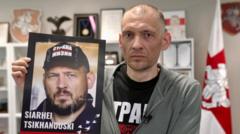This political drama unfolds following a court ruling that stripped Thiam of his citizenship, reflecting deeper issues related to identity politics amid looming elections.
**Ivory Coast's Political Turmoil: Citizenship Ruling Threatens Democratic Integrity**

**Ivory Coast's Political Turmoil: Citizenship Ruling Threatens Democratic Integrity**
The recent elimination of Tidjane Thiam from Ivory Coast's presidential race raises serious concerns about the nation's democratic principles.
As the electoral landscape in Ivory Coast prepares for an October presidential election, the political drama surrounding Tidjane Thiam underscores unsettling trends in the nation's democracy. Known for being one of the world’s cocoa giants and a hub of pivotal football talent, Ivory Coast is now grappling with serious questions regarding its leadership and the citizenry's faith in its political processes.
A milestone opportunity for Thiam, a distinguished figure in global finance, was abruptly halted on April 22 when a court ruled that he had lost his Ivorian citizenship due to acquiring French nationality years ago and failing to revoke it within the required timeframe. The ruling has plunged his aspirations to lead the country into uncertainty as he contemplates whether political maneuvering can revive his candidacy.
Thiam's return to Ivory Coast in 2022 marked him as a potential frontrunner for the presidency, stepping up after the demise of former President Henri Konan Bédié, the leader of the opposition Democratic Party of Ivory Coast (PDCI). A standout candidate, Thiam was positioned as a viable threat to the incumbent President Alassane Ouattara, who is currently in the last stretch of his third term and contemplating a fourth.
However, official barriers are being erected against reformist voices. The court’s decision could effectively diminish any competition facing Ouattara or his successor from the Rally of Houphouëtists for Democracy and Peace (RHDP). This lack of robust opposition could incite further public disenchantment with political establishments that have failed to address longstanding grievances.
Ivory Coast has witnessed significant economic growth under Ouattara’s leadership, yet this progress is juxtaposed against a backdrop of disillusionment arising from electoral manipulation and the persistent shadow of identity politics. The legal complexities stemming from citizenship rules evoke a painful history when identity became a tool for exclusion, triggering previous civil unrest.
Contrarily, the democratic landscape in West Africa has seen sparks of hope, with transformative elections in Liberia and the successful ousting of incumbents in Senegal and Ghana. Such moments raise expectations for Ivory Coast, with hopes set on fostering a democratic transition that would counteract stagnation—especially crucial in a region where youth constitute a significant demographic that desires change.
As Thiam's legal teams strategize to navigate the political quagmire, the broader implication of this crisis looms large for Ivory Coast's democracy. Common sentiments echo throughout the nation, emphasizing that the future direction of politics and governance hinges on addressing these deep-rooted identity issues that threaten to resurface.
With upcoming court hearings that could decide Thiam’s fate, the outcome remains uncertain. Observers are hopeful that political dialogue might lead to a resolution that revitalizes participation from banned candidates, setting the stage for a more dynamic electoral process—one that could enhance prospects for political accountability and representational legitimacy in West Africa.
A milestone opportunity for Thiam, a distinguished figure in global finance, was abruptly halted on April 22 when a court ruled that he had lost his Ivorian citizenship due to acquiring French nationality years ago and failing to revoke it within the required timeframe. The ruling has plunged his aspirations to lead the country into uncertainty as he contemplates whether political maneuvering can revive his candidacy.
Thiam's return to Ivory Coast in 2022 marked him as a potential frontrunner for the presidency, stepping up after the demise of former President Henri Konan Bédié, the leader of the opposition Democratic Party of Ivory Coast (PDCI). A standout candidate, Thiam was positioned as a viable threat to the incumbent President Alassane Ouattara, who is currently in the last stretch of his third term and contemplating a fourth.
However, official barriers are being erected against reformist voices. The court’s decision could effectively diminish any competition facing Ouattara or his successor from the Rally of Houphouëtists for Democracy and Peace (RHDP). This lack of robust opposition could incite further public disenchantment with political establishments that have failed to address longstanding grievances.
Ivory Coast has witnessed significant economic growth under Ouattara’s leadership, yet this progress is juxtaposed against a backdrop of disillusionment arising from electoral manipulation and the persistent shadow of identity politics. The legal complexities stemming from citizenship rules evoke a painful history when identity became a tool for exclusion, triggering previous civil unrest.
Contrarily, the democratic landscape in West Africa has seen sparks of hope, with transformative elections in Liberia and the successful ousting of incumbents in Senegal and Ghana. Such moments raise expectations for Ivory Coast, with hopes set on fostering a democratic transition that would counteract stagnation—especially crucial in a region where youth constitute a significant demographic that desires change.
As Thiam's legal teams strategize to navigate the political quagmire, the broader implication of this crisis looms large for Ivory Coast's democracy. Common sentiments echo throughout the nation, emphasizing that the future direction of politics and governance hinges on addressing these deep-rooted identity issues that threaten to resurface.
With upcoming court hearings that could decide Thiam’s fate, the outcome remains uncertain. Observers are hopeful that political dialogue might lead to a resolution that revitalizes participation from banned candidates, setting the stage for a more dynamic electoral process—one that could enhance prospects for political accountability and representational legitimacy in West Africa.




















